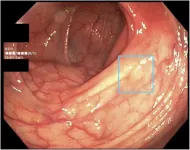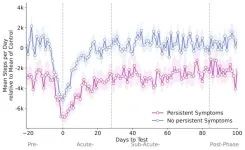(Press-News.org) Women with polycystic ovary syndrome (PCOS) find it harder to get pregnant, have more frequent miscarriages and have a higher risk of developing endometrial cancer. Now, in a new study published in Nature Medicine, Swedish researchers have shown that the uterine lining of these women differs in terms of both the composition of individual cells and gene expression. The results open the door to new drug treatments.
PCOS is the most common hormonal disorder affecting 11-13% of women of reproductive age. Women with the syndrome have difficulty getting pregnant and are at increased risk of miscarriage and uterine cancer, especially cancer of the endometrium. It is also common for affected women to be overweight and insulin resistant.
By studying endometrial tissue samples from five healthy women and 12 women with PCOS, the researchers created a cell map of individual cells. The women were all of similar age, weight and BMI and the tissue samples were taken at the same phase of the menstrual cycle to eliminate factors that could influence the analyses. In the study, all women were overweight, but only the women with PCOS were insulin resistant and had elevated levels of male sex hormones.
In total, almost 250,000 cell nuclei from the women's uterine linings were analysed. The researchers found a clear difference in the composition of cell types with a higher proportion of so-called epithelial cells and a lower proportion of stromal cells in the uteruses of women with PCOS.
“These results show that the growth of the cells is affected, which may explain why it can take longer for affected women to become pregnant and why they are more likely to miscarry, as well as contributing to the increased risk of endometrial cancer,” says Elisabet Stener-Victorin, Professor of Reproductive Physiology at Karolinska Institutet and research leader of the current study.
In the detailed cell map, the researchers can show that many genes in specific cell types have a disturbed expression in women with PCOS. A large proportion of the affected genes are linked to difficulties for the early embryo to attach to the uterus, miscarriage and endometrial cancer with functions affecting cell-to-cell attachment and communication.
“Our analyses show that certain cell types in the endometrium have disrupted communication and interaction specific to PCOS,” says Gustaw Eriksson, one of the study's first authors and a doctoral student in Elisabet Stener-Victorin's research group.
The study also included a part where the women with PCOS underwent treatment with the diabetes drug metformin with or without lifestyle advice on diet and exercise. After 16 weeks of treatment, the researchers found that many gene expressions in specific cell types, especially in the epithelial and stromal cells, were normalised by metformin, but also by lifestyle changes, although not as pronounced.
“We can show that metformin seems to have many more functions in women with PCOS than lowering blood sugar. In the study, all the women were overweight, but it is likely that metformin has similar effects in affected women who are not overweight but insulin resistant if they have problems getting pregnant or have repeated miscarriages,” says Elisabet Stener-Victorin.
Another important finding was the correlation between gene expression in specific cell types and important clinical features of PCOS, such as elevated levels of male sex hormone and insulin resistance, highlighting the complex relationship between hormonal and metabolic factors and endometrial dysfunction.
“As we identified changes in gene expression in specific cell types, this study provides crucial guidance for developing more targeted treatments for PCOS-related endometrial dysfunction,” says Elisabet Stener-Victorin.
The study is a collaboration with Dr Congru Li as joint first author, and Associate Professor Qiaolin Deng and Associate Professor Sophie Petropoulos with joint senior and corresponding authorship.
The research was funded by the Swedish Research Council, the Novo Nordisk Foundation, the Diabetes Foundation and the Knut and Alice Wallenberg Foundation, among others. The researchers declare that there are no conflicts of interest.
Publication: ‘Single-Cell Profiling of the Human Endometrium in Polycystic Ovary Syndrome’, Gustaw Eriksson, Congru Li, Tina Gorsek Sparovec, Anja Dekanski, Sara Torstensson, Sanjiv Risal, Claes Ohlsson, Angelica Lindén Hirschberg, Sophie Petropoulos, Qiaolin Deng, Elisabet Stener-Victorin. Nature Medicine, online 20 March 2025, doi: 10.1038/s41591-025-03592-z.
Facts: PCOS
Polycystic ovary syndrome, or PCOS, is a hormonal disorder that affects the functioning of the ovaries and affects approximately 11 to 13 per cent of women of childbearing age. It is characterised by irregular or absent ovulation, elevated levels of male sex hormones (androgens) and immature ovarian follicles. Common symptoms include menstrual irregularities, acne, increased body hair and difficulty getting pregnant. The condition is also linked to metabolic problems such as insulin resistance and an increased risk of type 2 diabetes and cardiovascular disease. Around 40 per cent of affected women develop it at a relatively early age. Source: https://www.monash.edu/medicine/mchri/pcos/guideline
END
Cell atlas of the endometrium in women with PCOS may lead to better treatment
2025-03-20
ELSE PRESS RELEASES FROM THIS DATE:
New rules for the game of memory
2025-03-20
As animals experience new things, the connections between neurons, called synapses, strengthen or weaken in response to events and the activity they cause in the brain. Neuroscientists believe that synaptic plasticity, as these changes are called, plays an important role in storing memories.
However, the rules governing when and how much synapses change are not well understood. The traditional view is that the more two neurons fire together, the stronger their connection becomes; when they fire separately, their connection weakens.
New research ...
A simple way to control superconductivity
2025-03-20
Scientists from the RIKEN Center for Emergent Matter Science (CEMS) and collaborators have discovered a groundbreaking way to control superconductivity—an essential phenomenon for developing more energy-efficient technologies and quantum computing—by simply twisting atomically thin layers within a layered device. By adjusting the twist angle, they were able to finely tune the “superconducting gap,” which plays a key role in the behavior of these materials. The research was published in Nature Physics.
The superconducting gap is the energy threshold required to break apart Cooper pairs—bound electron pairs that enable superconductivity at low temperatures. ...
New CRISPR tool enables more seamless gene editing — and improved disease modeling
2025-03-20
New Haven, Conn. — Advances in the gene-editing technology known as CRISPR-Cas9 over the past 15 years have yielded important new insights into the roles that specific genes play in many diseases. But to date this technology — which allows scientists to use a “guide” RNA to modify DNA sequences and evaluate the effects — is able to target, delete, replace, or modify only single gene sequences with a single guide RNA and has limited ability to assess multiple genetic changes simultaneously.
Now, however, Yale scientists have developed a series of sophisticated mouse models using CRISPR (“clustered regularly ...
AI technology for colon cancer detection shows promise for widespread use – in the future
2025-03-20
The American Gastroenterological Association (AGA) released a new clinical guideline making no recommendation — for or against — the use of computer-aided detection systems (CADe) in colonoscopy. A rigorous review of evidence showed that artificial intelligence-assisted technology helps identify colorectal polyps. However, its impact on preventing colorectal cancer — the third most common cancer worldwide — remains unclear.
Colonoscopy, performed more than 15 million times annually in the U.S., is an effective tool for detecting and preventing colorectal cancer. CADe systems have been shown to improve polyp detection ...
Researchers identify promising drug candidates for previously “undruggable” cancer target
2025-03-20
For the first time scientists have identified promising drug candidates that bind irreversibly with a notoriously “undruggable” cancer protein target, permanently blocking it.
Transcription factors are proteins that act as ‘master switches’ of gene activity and play a key role in cancer development. Attempts over the years to design “small molecule” drugs that block them have been largely unsuccessful, so in recent years scientists have explored using peptides – small protein fragments – to block these “undruggable” targets.
Now researchers from the University of Bath have for ...
Smartwatch data: Study finds early health differences in long COVID patients
2025-03-20
[Vienna, 19.03.2025]—Between April 2020 and December 2022, over 535,000 people in Germany downloaded and activated the Corona Data Donation App (CDA). Of these, more than 120,000 voluntarily shared daily data from their smartwatches and fitness trackers with researchers, providing insights into vital functions such as resting heart rate and step count.
“These high-resolution data served as the starting point for our study,” explains CSH researcher Katharina Ledebur. “We were able to compare vital signs in 15-minute intervals before, during, and after a SARS-CoV-2 infection.”
Higher Resting Heart Rate ...
Mere whiff of penguin poo pushes krill to take frantic evasive action
2025-03-20
Imagine looking at the world through the stalked compound eyes of krill in the Southern Ocean. All of a sudden, a penguin appears like a voracious giant, streamlined like a torpedo, chasing and consuming thousands of krill at rapid speed.
Now, researchers have shown that the water-borne smell of the poo of these flightless birds is enough to cause the krill to show escape behaviors.
“Here we show for the first time that a small amount of penguin guano causes a sudden change in the feeding and swimming behaviors of Antarctic krill,” said Dr Nicole ...
Deep in the Mediterranean, in search of quantum gravity
2025-03-20
Quantum gravity is the missing link between general relativity and quantum mechanics, the yet-to-be-discovered key to a unified theory capable of explaining both the infinitely large and the infinitely small. The solution to this puzzle might lie in the humble neutrino, an elementary particle with no electric charge and almost invisible, as it rarely interacts with matter, passing through everything on our planet without consequences.
For this very reason, neutrinos are difficult to detect. However, in rare cases, ...
Parts of the brain that are needed to remember words identified
2025-03-20
The parts of the brain that are needed to remember words, and how these are affected by a common form of epilepsy, have been identified by a team of neurologists and neurosurgeons at UCL.
The new study, published in Brain Communications, found that shrinkage in the front and side of the brain (prefrontal, temporal and cingulate cortices, and the hippocampus) was linked to difficulty remembering words.
The new discovery highlights how the network that is involved in creating and storing word memories is dispersed throughout the brain.
This is particularly crucial for helping to understand conditions such as epilepsy, in which patients may have difficulty with remembering words. ...
Anti-amyloid drug shows signs of preventing Alzheimer’s dementia
2025-03-20
An experimental drug appears to reduce the risk of Alzheimer’s-related dementia in people destined to develop the disease in their 30s, 40s or 50s, according to the results of a study led by the Knight Family Dominantly Inherited Alzheimer Network-Trials Unit (DIAN-TU), which is based at Washington University School of Medicine in St. Louis. The findings suggest – for the first time in a clinical trial – that early treatment to remove amyloid plaques from the brain many years before symptoms arise can delay the onset of Alzheimer’s dementia.
The study is published March 19 in The Lancet Neurology.
The international study ...




